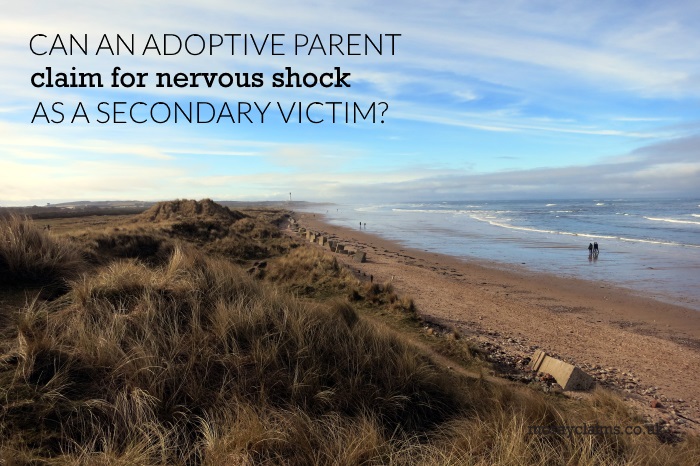Here’s a question sent in to us via this website.
Regarding your article ‘How Nervous Shock Claims depend on whether you are a Primary or Secondary Victim‘ posted on 9th Dec 2016, I’m curious to know whether the mother of an adopted daughter can be regarded as a secondary victim?
That article explained how Nervous Shock is not a medical term but instead one used by lawyers to describe a range of psychiatric conditions that can follow from an accident.
Primary victims are people who are injured by being directly involved in the accident circumstances.
Secondary victims are people who witnessed what happened to those directly involved in the accident but were not themselves “part of the action”. Claimants in the category of secondary victim suffer psychiatric injury because of fear for the safety of another.
In general terms, it’s much easier to succeed with a Nervous Shock claim if you are a primary victim than if you are a secondary victim.
For fear that an avalanche of claims could follow if every bystander to an accident could potentially claim as a secondary victim, the law has developed a series of policy “control” mechanisms.
These controls include the so-called “hearness, nearness and dearness” tests.
Hearness? You must perceive the event through your unassisted senses.
Nearness? There must be proximity in space and time between you and the event. You need to witness it directly or at least the immediate aftermath of the event.
Dearness? If you were not the parent, spouse of child of the person who has been injured or killed (the primary victim), you would have to prove a close tie of love and affection. Secondary victim cases typically concern the closest of family ties – husband/wife, parent/child, etc. – and these are unlikely to be problematic in meeting the dearness criterion.
Essentially, a rebuttable presumption arises in favour of a close tie of love and affection in the case of parental and spousal relationships. On the other hand, in the case of more remote relatives and friends, psychiatric injury would not normally be regarded as reasonably foreseeable. It would be up to the claimant to establish that a relationship – a close tie of love and affection – akin to a spousal or parental relationship existed.
Going back to the question about an adoptive parent of a child at the top of this article…
The answer would be that, subject to satisfying the other policy requirements –
• Development of a recognised psychiatric illness
• Shocking / traumatic event
• Hearness
• Nearness
The mum would have a stateable claim because the fact of being an adoptive parent would give her the necessary “dearness”. Under Scots Law, an adoptive parent supercedes and replaces the natural parent as the child’s parent.
The adoption legislation creates a new relationship of parent and child which, for practically all legal purposes, replaces the previous relationship. An adoption order severs irrevocably and for all time the legal relationship between a child and his/her family of birth.
You can find support for this line of thinking in a case about a claim for fatal accident damages by the natural half-siblings of an adopted person.
Foreman v Advocate General for Scotland (2016), a decision of Temporary Judge Reid in the Court of Session, concerned a claim for compensation by the biological half-brother and half-sister of a man who died in 2012.
The deceased had been adopted in 1987.
The half-brother and half-sister were children of the deceased’s biological father, born after the deceased was adopted.
It’s important to note that this was not a primary / secondary victim scenario.
The half siblings’ claim was under the Damages (Scotland) Act, which provides that compensation for loss of society (“bereavement damages”) is payable to members of the deceased’s “immediate family” if the deceased died as the result of negligence or breach of duty on the part of another.
Brothers and sisters are included in the definition of “immediate family” and that also covers half brothers and sisters.
The question for the court was whether it was “wrong” that non-biological siblings, such as an adoptive sibling, should be entitled to claim compensation but not biological half brother and sisters.
The claims by the half-brother and half-sister failed.
In confirming that the Damages (Scotland) Act did not give rights to biological members of the family of a deceased who had been adopted, the court took the view that this approach was entirely consistent with the principles underlying adoption legislation.
An adoption effectively severs all links with the biological family. The adoptive family takes the biological family’s place, in terms of rights and obligations.
How we can help
If you have any questions as a result of this article, feel free to get in touch.
As you can see, we answer as many questions as we can and will put the answers on this website wherever possible in order to improve the breadth and depth of information we provide to those seeking help with these subjects. “Can an adoptive parent claim compensation for nervous shock as a secondary victim?” is a specific question and specific questions are good.
You can call us on 01343 544077 or send us a Free Online Enquiry.
